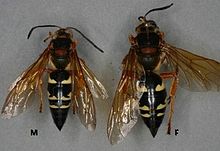Sphecius speciosus
| Sphecius speciosus | |
|---|---|
 |
|
| Adult male (left) and female (right) | |
| Scientific classification | |
| Kingdom: | Animalia |
| Phylum: | Arthropoda |
| Class: | Insecta |
| Order: | Hymenoptera |
| Family: | Crabronidae |
| Genus: | Sphecius |
| Species: | S. speciosus |
| Binomial name | |
|
Sphecius speciosus (Drury, 1773) |
|
| Synonyms | |
|
|
Sphecius speciosus, often simply referred to as the cicada killer or the cicada hawk, is a large digger wasp species. Cicada killers are large, solitary wasps in the family Crabronidae. The name may be applied to any species of crabronid which preys on cicadas, though in North America it is typically applied to a single species, S. speciosus. However, since there are multiple species of related wasps, it is more appropriate to call it the eastern cicada killer. This species occurs in the eastern and midwest U.S. and southwards into Mexico and Central America. They are so named because they hunt cicadas and provision their nests with them. In North America they are sometimes called sand hornets, although they are not hornets, which belong to the family Vespidae. Cicada killers exert a measure of natural control on cicada populations and thus may directly benefit the deciduous trees upon which their cicada prey feed.
The most recent review of this species' biology is found in the posthumously published comprehensive study by noted entomologist Howard Ensign Evans.
Adult eastern cicada-killer wasps are large, 1.5 to 5.0 centimetres (0.6 to 2.0 in) long, robust wasps with hairy, reddish and black areas on the thorax (middle part), and are black to reddish brown marked with light yellow stripes on the abdominal (rear) segments. The wings are brownish. Coloration superficially resembles that of some yellowjacket and hornet species. The females are somewhat larger than the males, and both are among the largest wasps seen in the Eastern United States, their unusual size giving them a uniquely fearsome appearance. European hornets (Vespa crabro) are often mistaken for Eastern cicada killers.
Solitary wasps (such as the eastern cicada killer) are very different in their behavior from the social wasps such as hornets, yellowjackets, and paper wasps. Cicada killer females use their sting to paralyze their prey (cicadas) rather than to defend their nests; unlike most social wasps and bees, they do not attempt to sting unless handled roughly. Adults feed on flower nectar and other plant sap exudates.
...
Wikipedia
